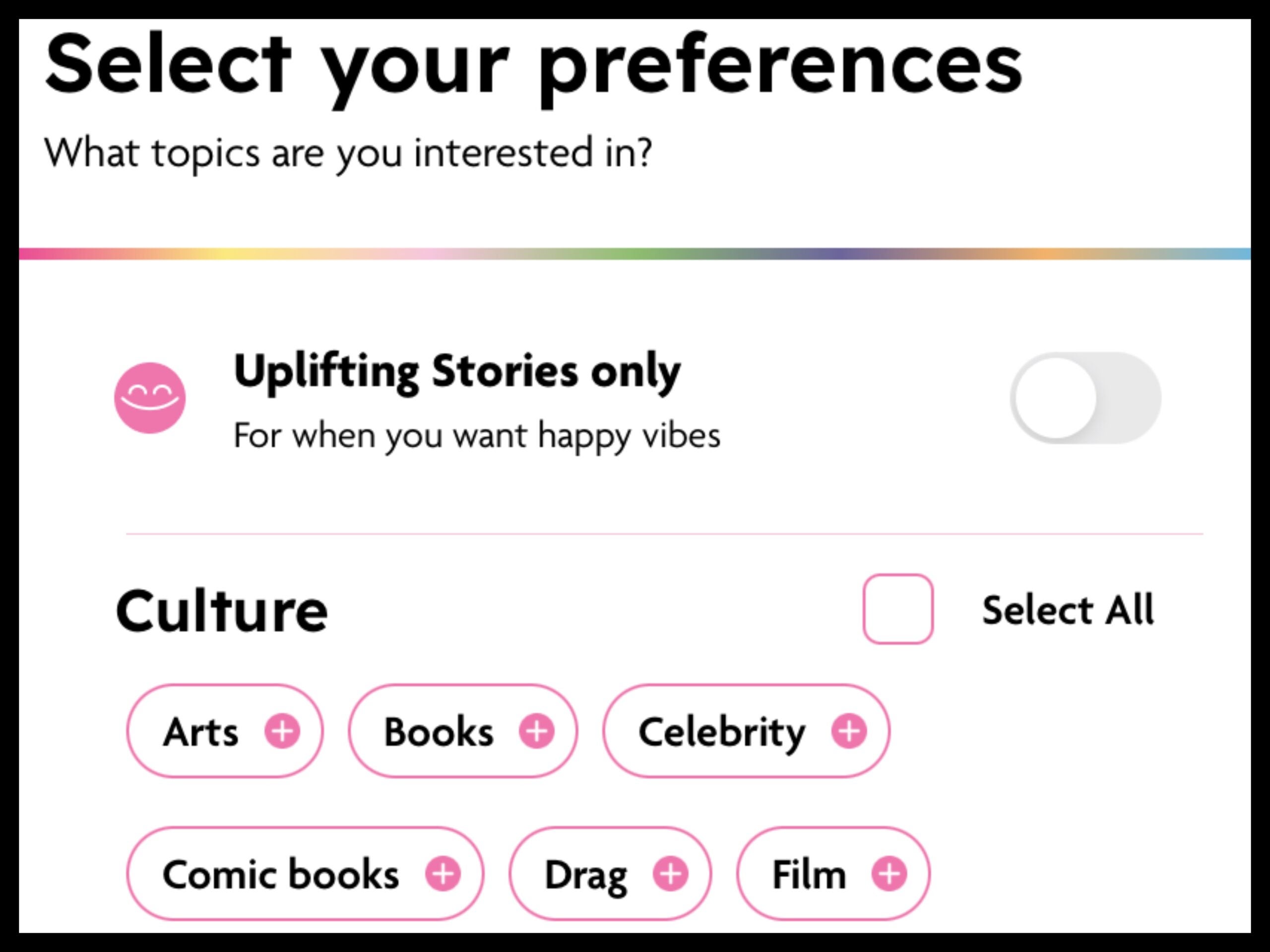
LGBTQ+ brand Pink News has given its readers the option to see only “uplifting” stories after studies showed the increasing numbers of consumers avoiding the news because of the impact it has on their mood.
Pink News set about rebuilding its website and app this year and decided it would be a good opportunity to give people more control over what they read.
The new feature allows users to choose to see only positive stories in the “latest” feed and personalised “your feed” on the app, helping people on days when they might need a “pick-me-up” or not feel up to coping with some of the more depressing news stories.
Chief product officer Sarah Watson told Press Gazette: “It was to enable people just have that option not to necessarily filter out bad news completely, but it’s being able to take that break when you need it.”
Watson said that around 25% of people in a recent reader survey said they were interested in just being able to read uplifting news as they come to the site specifically to read positive stories.
The rebuilt app now gives users the option to see “uplifting stories only”, which the display tells them is “for when you want happy vibes”. The plan is to add the feature to the website in 2023.
The Reuters Institute for the Study of Journalism’s Digital News Report this year found that 46% of people sometimes or actively avoid the news – up from 24% in 2017 and 35% in 2019. There has been a similar trend elsewhere, including in the US where news avoidance is up from 38% in 2017 to 42%.
One of the biggest reasons for avoiding the news, especially in the UK (55%) and US (49%), is people not wanting it to have a negative effect on their mood. This is even higher among under 35s in the UK where 64% said the news brings down their mood.
A 27-year-old man in the UK told the study he actively avoids reading about “things that trigger my anxiety and things that can have a negative impact on my day” like deaths and disasters. A 29-year-old woman said she tries to limit the amount negative news she consumes because she does not “want it to affect my day or make me worry”.
Watson said the Pink News team were well aware of these statistics, which echo their own feedback from readers.

Pink News said in its explanation for the new filter that now is “a time of continued anguish for the LGBTQ+ community”. BBC News reported in February that hate crimes against people based on sexual orientation had doubled in four years, while in the US last month five people were killed in a mass shooting at an LGBTQ+ nightclub in Colorado Springs. Pink News also pointed to the “ongoing anti-trans rhetoric used in legacy media”.
Watson said they had received emails from readers asking if there was a way to filter the news a bit more by how it makes people feel or the mood of the article.
Pink News also ran a major reader survey last year and saw a high proportion of people keen on the idea of being able to personalise their news, with many making additional comments that they would like to be able to only read uplifting stories and filter out specific subjects and triggering topics.
Although the “uplifting” filter is only on the Pink News app so far, its new website has added a feature asking people at the bottom of stories how it made them feel, with the option to choose one of six emojis.

Watson said the Pink News team built the widget themselves, meaning the data can be collected to inform them about the emotional response their audience is having to articles.
“Then we can almost use that as another way of curating the content by mood rather than subject, which we think is quite unique to us,” Watson said. For example, Pink News can share the stories deemed most heartwarming with its newsletter subscribers, or tell them what had got people fired up.
Pink News founder and chief executive Benjamin Cohen said the “uplifting” news filter was “genuinely groundbreaking for the digital media industry”, adding: “As a business, we have long championed under-represented voices and through this, we have recognised the need to allow our audience only to see uplifting stories if they so wish in a world where they continue to be targeted.”
Cohen told Press Gazette earlier this year that Pink News resonates with Gen Z (those born between approximately 1997 and 2012) because of a number of factors including the issues it focuses on, its partnership with Snapchat Discover, a young staff and “fun, nurturing” internal culture.
But Watson said the new focus on mood is not just aimed at young readers but at Pink News’ whole audience, with news avoidance affecting people across demographics.
The major Pink News website and app redesign also focused on accessibility to a uncommon extent. Watson said the rebuilding, which included a change of domain from .co.uk to .com to reflect its global ambitions, was “probably the biggest change that Pink News has ever seen and will ever see in a long time” adding that it all took place under the lens of the brand’s aim “to be as inclusive and as accessible as it can possibly be”.
“What we’ve used as our kind of north star is the Pink News mission which is to inform, inspire change and empower people to be themselves, and that’s about being inclusive, and that’s about being accessible. So we’ve always come back to that actually, what is best from a reader perspective? And that’s what we’ve used to guide us on this on this big journey that we’ve been on.”
The accessibility drive led them to completely clean up the site’s code and rebuild it using a component library on a new CMS as this, Watson explained, will make it more consistent to its global audience no matter what device people are using or how good their internet connection is.
The site’s colours have also passed accessibility tests for visually impaired and colour blind people, and a text-to-speech feature to help those with visual impairments is another feature set to be added, which Watson said will also benefit people who are out and about and want to listen to the news rather than read it.
Watson said that “significantly improving our core web vitals, using a flexible, scalable design language and introducing new features like our uplifting news filter” was “the first important step in bringing wider inclusivity to the Pink News digital experience”.
Email pged@pressgazette.co.uk to point out mistakes, provide story tips or send in a letter for publication on our "Letters Page" blog
